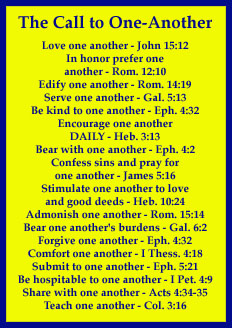The Deepest Freedom

By Wayne Jacobsen
BodyLife • January 2001
The familiar voice on the phone brought back incredible memories of the friendship we had shared, even though it had been almost two years since we had last spoken. “What has God been doing in you?” he asked after we had exchanged pleasantries.
Before I realized what I was saying, the words rolled off of my tongue: “Over the past few years God has defied to the nth degree every expectation and desire I had for my life.” I was so surprised at my own answer and how smoothly it had flowed from my lips that as I paused to think about it an uneasy silence hung on the line.
After a few moments he spoke again, quite tentatively, “And is that a good thing?”
I remember chuckling as I answered, “It is the best thing!”
“Really?”
“Yes! In every way, what Father has accomplished in me was far better than anything I had tried to produce for myself.”
I was probably as surprised by the answer as he was. My life is far from any idealized existence I’d been taught to dream. The last few years had brought many painful circumstances that I would have changed in an instant had I the power to do so, as well as a number of disappointed hopes that I thought were as much God’s idea as mine.
What I realized in that moment, however, was that none of those things mattered anymore. Somehow in this incredible journey he had guided me toward a deeper level of freedom. What had for most of my spiritual journey been a great source of frustration—that God would not meet my expectations of him—had in fact been his hand setting me free from the worst kind of bondage.
I wanted him to please me; he wanted me to be free of the need to be pleased. Painful circumstances and disappointing expectations had been the incubator in which God wanted to teach me to stop trusting my expectations for my life and embrace his.
The Tyranny of Self
Today, I look back in awe. In spite of my best efforts at times to the contrary, God has steadily drawn me to himself. The things he’s changed in me, the people he has brought into my life, the way he has provided, and the doors he has opened to share his reality with others are far beyond anything I could ever have asked or imagined. (Which is a clear way of saying this is not the way I would have done it!)
I am now living the life in him the life I always thought was possible when I read with deep longing the Scriptures that spoke of God’s reality. Along the way, many tried to convince me I was just too idealistic. They told me that the relationship I desired with him and the depth of body life I hungered for with other believers were not going to be found in this age of fallen humanity. They may be right if we’re looking for fallen humanity to produce it—especially if we look to ourselves. But he has ways, to do just that in each of us if we ask him to do so.
But the greatest tyranny in our lives is not legalism, tradition nor religious obligation so prevalent in our day. As binding as those things can be, a more powerful tyrant holds us captive from the true depths of Father’s life and joy—self! We can be free of all the others and yet remain captive to this one that matters most.
I’ve seen it happen far too often. The nature of the things God’s asked me to write brings me to people who are discovering just how much bondage organized religion has become in our day. While it promises a dynamic relationship with the Living God, it too often only offers a program of behavioral conformity that leaves many empty, manipulated and disillusioned. Watching God set people free from that bondage is always a joy. However, freedom from those things without also finding freedom from the tyranny of self only becomes an excuse for greater bondage to the flesh. Paul warned the Galatians just how true that is.
Our greatest captivity is not to any other person or system; it is to self. And the greater bondage here is not the appetites of the flesh we clearly know are sinful, but the agendas we hold for our own good. Trying to get God to do for me what I think is best has tripped me up far more effectively, than more obvious sins.
God’s Will As A Joy
About six months ago I ran across these words from I Peter 4:1-2 in The Message, Eugene Peterson’s translation of the Bible. I think I have shared them just about everywhere I’ve gone since because I think they capture the heart of living as one of God’s children.
“Since Jesus went through everything you’re going through and more, learn to think and act like him. Think of your sufferings as a weaning away from the old sinful habit of always expecting to get your own way. Then you’ll be able to live out your days free to pursue what God wants instead of being tyrannized by what you want.”
Growing up as a young Christian I used to view doing God’s will as the overwhelming burden of the serious disciple. Somehow we were supposed to find the will-power to deny ourselves all the things we really wanted to do and then force ourselves to do God’s will. Doing his will was not something to be desired, but endured.
This translation turns that thinking on its head. Who wouldn’t want to wake up everyday free to engage God’s desires in their life? I’ll tell you who: those who have no idea who God is. If you think him a demanding taskmaster, you will find his will not only frustrating but you’ll also never be sure what it is. However, once you know him as he really is and are secure in how much he loves you, pursuing what he wants everyday will become your greatest joy.
Notice how Peter regards our self-nature. It is the tyrant, not God. I can think of no better words to describe our own agenda. When you go into a situation having to get your own way, don’t you feel tyrannized? I have. I was so afraid I wouldn’t be able to survive if I didn’t get what I wanted that I pressured myself and everyone else to conform to what I thought best. The weight of pulling that off is a tyranny all its own and a source of great anxiety for us and manipulation for others.
The real joy of being God’s child is waking up everyday with the simple freedom to join God in what he wants. As Jesus said, he is always working, in our lives and in people around us. He wants to share in the delight of that working, as a Father with his son or daughter. There is no greater freedom than to do so without distorting that with false needs and misplaced wants.
The School of Hard Knocks
How does that freedom come? Do you think you can just read an article or book about it and turn around and do it? I wish! How does God free us from our own agenda and teach us how much fun it is to embrace his? He does it by defying our misplaced expectations. That’s why Peter encouraged us to think of our sufferings as God’s way of weaning us away from having to get our own way.
Peter didn’t say he orchestrates our sufferings. He doesn’t create your troubles to teach you a lesson, but simply uses the troubles of life in this age to show you his freedom. He just graciously refuses to settle for flawed agendas and continues to fulfill his own in the lives of those who have asked him to do so.
He doesn’t deny us what we want to frustrate us, but to show us that he knows best about everything. The only way we figure that out is to watch our hard-fought agendas fall to nothing and to see God’s working exceed our greatest expectations.
This is not an easy process, as I’m sure you already know. When God doesn’t do the things we expect him to, we often wonder if he doesn’t love us, or if we haven’t done enough to earn his favor. Only by knowing that he loves you completely will you ever be able to go through moments of suffering as the weaning process he desires.
God’s not punishing you he is fulfilling your hunger at a deeper level. When I first started publishing books in the late 80’s I was just certain God wanted me to be a best-selling author and reform his church by the influence of the words I was writing. When book distribution was well below my expectations, I was frustrated at God. When my first two books went out of print, I was downright angry. Why would God fail me? Weren’t my desires only for his best interest? (You can laugh now!)
The more “my ministry” didn’t grow the way I desired, the more frustrated I got with God. Did that change the way he treated me? Not one bit! He still moved ahead to work his desires into my life. It almost killed me because I didn’t trust him. I was so tuned to what I thought God wanted I couldn’t recognize what he was actually doing. During those days my life was marked with bouts of anger, frustration, and anxiety.
Over the years, however, I’ve seen God maneuver circumstances that continued to draw me closer to him and closer to what he really had in mind for me. He opened doors I wasn’t even knocking on. He showed me that his idea of ministry made mine look like garbage in comparison. He really does know what is best for us everyday and is fully capable to lead us to it as long as we keep inviting him to do so.
NATO Living
The trick is learning how to live each day in the expectancy of God’s working in the circumstances of my life, without giving in to the expectation that it must look any particular way to satisfy me. I have begun to taste of the freedom of that kind of trust, and it is the most incredible reality I’ve yet to find in his love.
Imagine the freedom of no longer having to try and manipulate God or others toward your desired outcome. Instead, you can simply find out what he is up to, and though it will often seem more painful in the short-term than you might want, his ways are always the best — not only in resolving our circumstances but transforming us through them.
A number of years ago I read a book about a man playing the last rounds of golf with his terminally ill father around the famed courses of Scotland. Early on that trip he realized how little he enjoyed golf because his only goal was to shoot the lowest score possible. Whenever he got an unlucky bounce or hit a bad shot he’d sulk for the next few holes and play even worse.
That’s when his father taught him to play NATO golf—Not Attached To Outcome. In other words, his father told him, don’t worry about the score, just enjoy the challenge of hitting each shot as well as you can. When it goes off track, go find it and figure out the best shot you can hit from there. Let the score take care of itself and even if you don’t have a good round you still get to enjoy a walk in a beautiful park and the friendship of your partners.
Perhaps we should learn to live each day Not Attached To Outcome. Wouldn’t we be truly free if we could do the same on our own spiritual journeys? Instead of being so focused on the outcomes we desire, we could simply trust that regardless of the outcome, God is doing his work in and through us. Now instead of wasting our time with him trying to get him on our page, we can simply enjoy our fellowship with him as he moves us to his. And believe me, it is a lot more peaceful walking with God on his page, than constantly trying to figure out how to get him on yours.
A Better Agenda
What God has been doing in you since the day you came to know him, is to liberate you from the tyranny of self. He knows that your ability to live in his rest, peace and joy, will not come when you get everything you want, but when you forsake all your wants and embrace his.
Through most of my spiritual journey, I’ve been an insecure person about God’s love for me and my significance in the world. Most of what drove my life in those early years was trying to be successful, in my own eyes and the eyes of others. My prayer life focused around those insecurities, trying to get God to arrange my circumstances so that I would not have to be afraid or risk failure.
It always amazed me when he seemed to ignore my most ardent prayers, especially for those things I was certain were part of his vision for my life. How could he not change the things that angered and frustrated me?
Thankfully he had something far better in mind. I wanted him to change my circumstances so I would never have the need to feel insecure or afraid. He wanted to change me so that no circumstance would ever make me afraid again. If my security was going to be based on circumstances, he knew I would never follow him to the incredible places he wanted to take me.
How did he do that? He allowed circumstances to confront my greatest insecurities over and over again. In spite of my cries for relief, he just kept showing up for me every day, swallowing my pain with his love and gently pointing me toward a better way.
The Joy of Freedom
Certainly he has far more to do in my life along these lines, but somehow the last few months have brought me to a new plateau of this freedom. I feel like I can walk into most situations now with a freedom to live without catering to my agenda. I am more excited about what he might do than what I think he should do.
I don’t find myself haunted by the same insecurities or plagued by the sleepless nights of anxiety. I don’t walk into difficult conversations with that knot in the pit of my stomach because I know the outcome is not in my hands but his. Without all that bondage, I find it much easier to recognize his hand and flow with it.
Yes, there are still times I would like him to change some of my circumstances in ways that would make it easier for me. Now, however, I have a healthy suspicion that the way I would go about anything in my life and the way God would are probably polar opposites. I still let him know my requests of him, but I listen more intently for his of me. I know that what he’s up to in every circumstance will be far better than anything I could conceive.
So if you find God defying some of your most passionate expectations, just consider that he is doing something more extraordinary in you than you have yet grasped. He is expressing his love to you at a deeper level so that you will no longer have to bow to the tyranny of self.
By opening your eyes to that reality he is showing you how to be truly free—not just from legalism, works or religious obligation, but from a more powerful foe still. He wants you to be free of you, and only by doing so will you be able to know the person he created you to be.
You’ll find that freedom to be one of God’s greatest gifts. It will allow you to enjoy him more deeply and to recognize more easily how he wants you to share in his work around you.
You, too, will wake up each day excited to embrace what God wants rather than being forced by the tyranny of your own wants. This freedom is like no other.
Download Article:
- Download Article PDF (84 KB)
OTHER TRANSLATIONS
- Spanish Translation (PDF 221 KB)




 No matter how independent we humans may try to be, there are times we can’t help wanting to share with others.
No matter how independent we humans may try to be, there are times we can’t help wanting to share with others. Thus the root of the problem is not our institutions, but our own self-needs and our attempts to get other people to fill up in us what we lack in our own relationship with God. You can almost find Scriptures to underscore that mistaken notion because God clearly works through others as the extension of his own hand. But that doesn’t mean that Jesus builds his body based on our self-needs. Far from it!
Thus the root of the problem is not our institutions, but our own self-needs and our attempts to get other people to fill up in us what we lack in our own relationship with God. You can almost find Scriptures to underscore that mistaken notion because God clearly works through others as the extension of his own hand. But that doesn’t mean that Jesus builds his body based on our self-needs. Far from it! By Wayne Jacobsen
By Wayne Jacobsen To hold something so beautiful for himself was unthinkable.
To hold something so beautiful for himself was unthinkable. How quickly the Galatians had lost sight of it! According to Paul, they had had a clear revelation of the crucified Christ and the glory it produced. They had experienced a work of the Spirit that had captured their heart and had swept them to the heights of what it meant to know Jesus.
How quickly the Galatians had lost sight of it! According to Paul, they had had a clear revelation of the crucified Christ and the glory it produced. They had experienced a work of the Spirit that had captured their heart and had swept them to the heights of what it meant to know Jesus. By Wayne Jacobsen
By Wayne Jacobsen